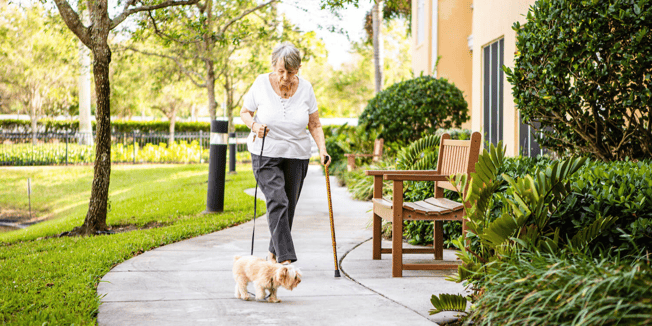Is Your Parent Just Sad, or Is It Depression? 8 Signs to Look For
Listen to this article

Approaching retirement can be a saving grace for some because this period of time is ripe with the potential to discover and rediscover what life is really about. However, naturally, there are aspects of aging and getting older that can have your parent or loved one feeling down. Recognizing the risk factors and symptoms of depression and understanding treatment options means you can help your loved one lead a safe, healthy, and happy life.
Why Do Seniors Become Depressed?
Depression is a complex illness with both biological and environmental factors playing a role, but a true underlying cause has yet to be defined. Although many factors of the condition are likely to be genetic, doctors still don’t fully understand why some people develop depression and others don’t.
Some risk factors for depression in older adults include:
- A family history of depression
- A serious health crisis or illness
- Chronic stress
- Loneliness
- Lack of physical activity or exercise
- Addiction or drug dependency
- Sleep difficulties
- Physical disabilities that affect a person’s daily quality of life
- Weather changes (some people develop seasonal affective disorder in the winter)
For some older adults, depression may begin as grief or sadness about something else, such as the death of a spouse. If a person’s grief seems to overtake everything else and affects their ability to function for a prolonged period, it could be a warning sign of depression.
8 Signs of Depression in Seniors
The most common indicators of depression in seniors are:
1. Sadness
Sadness is a key symptom of depression and often appears for no apparent reason. A person might have a seemingly happy life but is unable to enjoy it, or their sadness may be disproportionate to their situation. For example, a person might be unable to get out of bed for weeks after a minor setback.
Some important differences between depression sadness and other types of sadness and grief include:
- The sadness of depression may be unrelated to a person’s life circumstances.
- People with depression may be unable to feel happy even when their circumstances change or improve.
- The sadness of depression is often debilitating and may manifest suddenly.
2. Other Mood Changes
Some people with depression experience other severe mood changes or appear not to be sad at all. This is because people express their suffering in different ways, and culture can heavily influence a person’s emotions. For example, men sometimes appear angry, not sad, when they’re depressed.
Some mood changes to watch for include the person:
- Being irritable or short-tempered
- Being passive or withdrawn
- Being unusually aggressive or mean
- Seeming anxious or agitated
- Exhibiting any significant change in behavior or personality
3. Anhedonia
Anhedonia is a unique characteristic of depression that refers to the inability to feel pleasure or happiness. People who are sad about a life event or stressed out usually don’t experience anhedonia. They can feel temporary moments of joy, especially when things get better.
Depression, though, saps a person’s ability to enjoy the things they love. They may lose interest in their relationships too. Depression in older adults often manifests in isolating behaviors, so it’s important to try and surround them with people and things they love. But if nothing seems to distract your loved one or snap them out of their pain, even temporarily, this is a significant red flag for depression.
4. Weight Changes
Depression can cause weight fluctuations because it changes a person’s behavior and eating habits. Some biological changes of depression may also affect weight. If a person suddenly gains or loses significant weight or makes dramatic changes in their eating habits, it could signal depression.
5. Sleep Difficulties
Sleep is vital to a person’s health and well-being, especially as they age. Many people with depression experience sleep difficulties. They may sleep too much or not enough, both of which can exacerbate symptoms. For example, if your loved one can’t sleep, they’re more likely to feel anxious or agitated throughout the day. If they sleep too much, they may miss out on time with family.
6. Agitation
People with depression may become physically agitated and can be quick to anger. They may pace, seem anxious, or otherwise appear keyed up. Sometimes, people mistake depressive disorders for anxiety disorders because of this agitation.
7. Feelings of Guilt and Worthlessness
People with depression sometimes feel a profound sense of guilt or worthlessness. This may stymie efforts to get them help because some people with depression feel unworthy of help. Talking to them about their symptoms may inspire even further self-loathing. If your loved one devalues everything they do, expresses unreasonable guilt, or seems to hate themselves, that could be depression talking.
8. Thoughts of Death or Suicide
People with depression may be preoccupied with thoughts of death. Even if they don’t actually want to die, these thoughts can be intrusive and overpowering. They may obsess over bad things happening to themselves or to people they love or have frequent dreams of dying.
Depression may also cause a person to think of suicide or self-harm. If a person mentions wanting to die, take them seriously. Don’t assume this is a cry for attention or try to demean their feelings. Instead, seek emergency help for a loved one in crisis. Contact the 988 Suicide & Crisis Lifeline online or dial 988 on your phone.
Depression in seniors is sometimes prompted by trying to cope with the idea of approaching the later stages of life. It’s not uncommon for depression in older adults to manifest as a result of the major life changes associated with getting older, such as relocation, health conditions, and loss. It’s important your loved one knows that there’s plenty of life left to live, and even later years can host incredibly rewarding, memorable experiences.
How to Help a Loved One with Depression
You can’t cure or treat your loved one’s depression. Depression is a legitimate illness with physical effects, not a personal failing or something your loved one can will their way out of. Still, there are things you can do to support them and encourage them to get treatment.
Try the following:
- Don’t judge or shame your loved one by telling them to snap out of it, implying their problems aren’t that bad, or guilting them for their depression.
- Learn as much as you can about depression in older adults, then share that knowledge with your loved one. Talk about depression as a treatable illness, and look into depression prevention strategies to minimize risk factors.
- Offer gentle, loving support. Listen to your loved one. Empathize with their feelings. Show up for them. Talk to them about their options for a better life.
- Invite your loved one to do things with you as a distraction from the pain they’re experiencing.
- Offer to help your loved one pursue treatment. You might even offer to go with them to the doctor or to a therapist, perhaps one that specializes in depression in older adults.
- Consider asking your loved one to try treatment. This may circumvent resistance to treatment and help your loved one feel more in control, especially if they’re part of the group of people who think depression isn’t real.
The Right Senior Living Community Can Help Mitigate Depression in Older Adults
Senior living communities don’t treat depression, but the experience of living in one can reduce many depression risk factors by preventing isolation, loneliness, and a sedentary lifestyle. The right community also offers loving support that can inspire your loved one to seek the mental health treatment they need and deserve.
Communities such as Cedarhurst offer access to sensible culinary choices, various fitness programs, healthcare professionals, and plenty of other resources for improving and maintaining well-being to contribute to a balanced lifestyle.
At Cedarhurst, we do all we can to ensure every resident is leading their most fulfilling and enjoyable life by taking a holistic approach to wellness. This means you can be confident that your loved one is receiving the care they need and the opportunities they deserve.
This post was originally published in April 2023 and updated in August 2024.


.png?width=307&height=200&name=Blog%20%2332%201400%20x%20700%20(8).png)







.png?width=307&height=200&name=Blog%20%2333%201400%20x%20700%20(1).png)

